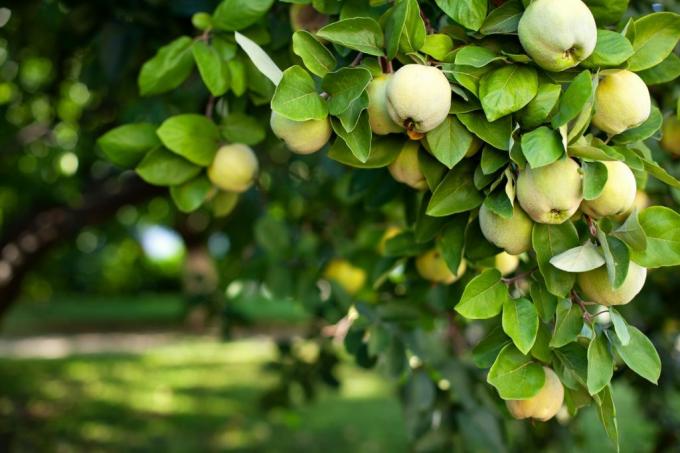The quince, as an old type of fruit, is slowly regaining popularity. We have summarized the best old and proven quince varieties for you and explain the difference between apple and pear quinces.

quinces (Cydonia oblonga) enjoyed great popularity for centuries. But in the meantime many old quince varieties have fallen into the past and some people cannot recognize a quince as such. But the fruits are not only spicy and aromatic, they also have a lot to offer in terms of health.
Old quince varieties
The variety of quinces is great. On closer inspection, many old regional varieties can be found. The quince farm MUSTEA in Franconia, for example, it has set itself the task of finding, preserving and selling old quince varieties. This not only promotes the diversity of varieties, but also the taste buds, because old varieties are often spicier and more aromatic than new breeds. You will therefore also discover some old varieties among the variety suggestions, such as the 'cotton quince' and the 'Franconian house quince'. Many regions have their own varieties. Take a look around, maybe you also have one or the other local quince variety in your region?
Raw quince varieties
In contrast to other local fruits, quinces are not suitable for raw consumption. A white fuzz covers the skin and tastes extremely bitter. In addition, the flesh of the fruit is much too hard to bite into it. But exceptions prove the rule, and so there is one or the other variety that can be eaten straight from the tree.
- ‘Turkish Sweet Quince’: The variety from Turkey is also known under the name Shirin quince and tastes extremely sweet and aromatic. In Turkey, it is often used to prepare a wide variety of desserts.
- ‘honey quince’: The 'honey quince' is an originally Franconian variety. As the name suggests, it is extremely sweet and its flesh is pleasantly soft. Unfortunately, the fruits are therefore quite sensitive to pressure and can only be stored for a few days.
Apple quince: the best varieties
The number of quince varieties is huge and so they are often divided into apple and pear quinces. In principle, the classification is not very profound, but is based purely on the shape of the fruit. Apple quinces therefore have a rounded shape reminiscent of an apple. However, no conclusions can be drawn about the taste.

- ‘Constantinople apple quince’: The most cultivated apple quince in Germany is the 'Konstantinopeler Apfelquintte'. It brings a high yield and is not sensitive to frost. The fruits are aromatic and only lightly felted with bitter fur.
- ‘Leskovac’: This variety is also known as the ‘Leskovac giant quince’. No wonder, because the fruits of this Serbian variety from the century before last are really huge. They are extremely juicy and mildly aromatic, but unfortunately also somewhat sensitive to pressure. It is important with this variety that a second quince tree of a different variety grows in the area. The ‘Leskovac’ variety is self-sterile and only bears fruit when fertilized by foreign pollen.
- ‘Cotton Quince’: Like so many old German quince varieties, the 'cotton quince' comes from Franconia. It is characterized by the nutty aroma of its fruits. These ripen late, but are extremely storable.
Pear quince: The best varieties
In contrast to apple quinces, the representatives of the pear varieties are rather elongated and pear-shaped. However, this is a purely external criterion. The flavor intensity and hardness of the pulp depends solely on the variety itself.

- ‘Portuguese Pear Quince’: The ‘Portuguese pear quince’ is widely known and cultivated. It is vigorous and delivers a rich yield. The large fruits are soft and juicy, but therefore also quite sensitive to pressure.
- ‘Bereczki’:The 'Bereczki' variety came from Hungary to German-speaking countries. Its fruits begin to ripen as early as September and are sweet and sour and aromatic.
- ‘Franconian house quince’: Anyone who particularly loves the scent of quince should try the ‘Franconian house quince’. Their scent is exceptionally spicy and the quinces can be stored for a very long time. The taste also leaves nothing to be desired and the hard fruits develop an extremely intense quince aroma.
The most important thing too Harvesting and storage of quinces find out in this article.
